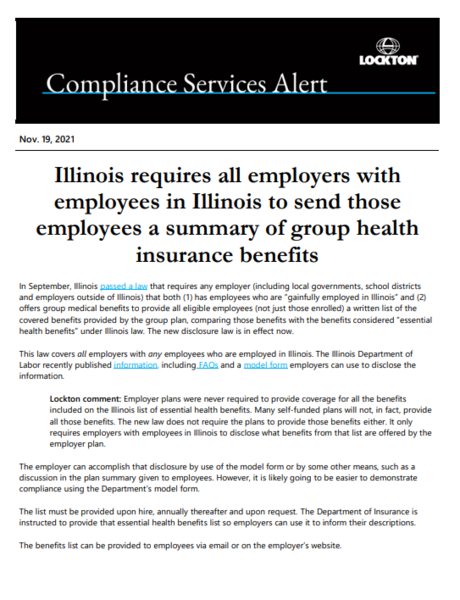In September, Illinois passed a law (opens a new window) (opens a new window)that requires any employer (including local governments, school districts and employers outside of Illinois) that both (1) has employees who are “gainfully employed in Illinois” and (2) offers group medical benefits to provide all eligible employees (not just those enrolled) a written list of the covered benefits provided by the group plan, comparing those benefits with the benefits considered “essential health benefits” under Illinois law. The new disclosure law is in effect now.
This law covers all employers with any employees who are employed in Illinois. The Illinois Department of Labor recently published information (opens a new window), including FAQs (opens a new window) and a model form (opens a new window) employers can use to disclose the information.
Lockton comment: Employer plans were never required to provide coverage for all the benefits included on the Illinois list of essential health benefits. Many self-funded plans will not, in fact, provide all those benefits. The new law does not require the plans to provide those benefits either. It only requires employers with employees in Illinois to disclose what benefits from that list are offered by the employer plan.
The employer can accomplish that disclosure by use of the model form or by some other means, such as a discussion in the plan summary given to employees. However, it is likely going to be easier to demonstrate compliance using the Department’s model form.
The list must be provided upon hire, annually thereafter and upon request. The Department of Insurance is instructed to provide that essential health benefits list so employers can use it to inform their descriptions.
The benefits list can be provided to employees via email or on the employer’s website.
Lockton comment: Note that this is a not blanket application of the ability to use electronic communication. The ERISA rules that govern electronic communication are somewhat more complicated. Please reach out to your Lockton account team for a guide on those rules.
Noncompliant employers may be fined $1,000 for the first offense, $3,000 for the second offense, and $5,000 for the third and subsequent offenses, if the employer has at least four employees. Employers with fewer than four employees are subject to penalties of $500, $1,000, and $3,000, respectively. Among the materials posted by the Illinois Department of Labor is an online form for aggrieved employees to file a complaint.
What about ERISA preemption?
Because this notice obligation is directed explicitly at employer plans, it may well be preempted by ERISA, with respect to ERISA covered employers. ERISA preempts state laws that directly or indirectly relate to an ERISA plan, and while ERISA preemption has been eroded in recent years, courts are more likely to rule in favor of preemption where the state law affects administration of the plan.
If the law is preempted, it should not matter whether the employer plan is insured or self-funded; while states retain the right to regulate insurers, they do not have the right to dictate to employers how to administer their ERISA plans. The Illinois law takes aim at employer group plan sponsors, not insurers.
Lockton comment: There’s no guarantee that courts will conclude ERISA preempts the state law. Courts could conclude the new notice obligation is so trifling as to not warrant preemption. In any event, the problem with ERISA’s preemption shield is that we won’t know for sure whether it applies until an employer challenges the law in court, citing ERISA preemption.
The Department of Labor has stated in its FAQs that it does not believe the requirement is preempted since it is directed at employers and employees and not at the plans. That might be a valid distinction but, given the stakes involved, we would not expect a challenge from an employer. We suspect that they will issue the notice along with all the other notices that are provided regularly to employees.
What should employers do?
Because the new Illinois law requires a notice that is largely duplicative of the general ERISA and ACA requirements associated with plan summaries (the summary plan description and summary of benefits and coverage disclosures), we hoped that most plan sponsors could rely on the plan documents and SPDs that largely met the new state law’s disclosure requirements. However, the Department of Labor, while acknowledging that plans are not required to use the model template, has indicated that the notice does need to list the Illinois essential health benefits that are not covered. Therefore, the most likely way to meet the Department’s requirements would be to use its forms for those disclosures.
 Read alert (opens a new window)Not legal advice: Nothing in this alert should be construed as legal advice. Lockton may not be considered your legal counsel, and communications with Lockton's Compliance Services group are not privileged under the attorney-client privilege.
Read alert (opens a new window)Not legal advice: Nothing in this alert should be construed as legal advice. Lockton may not be considered your legal counsel, and communications with Lockton's Compliance Services group are not privileged under the attorney-client privilege.

